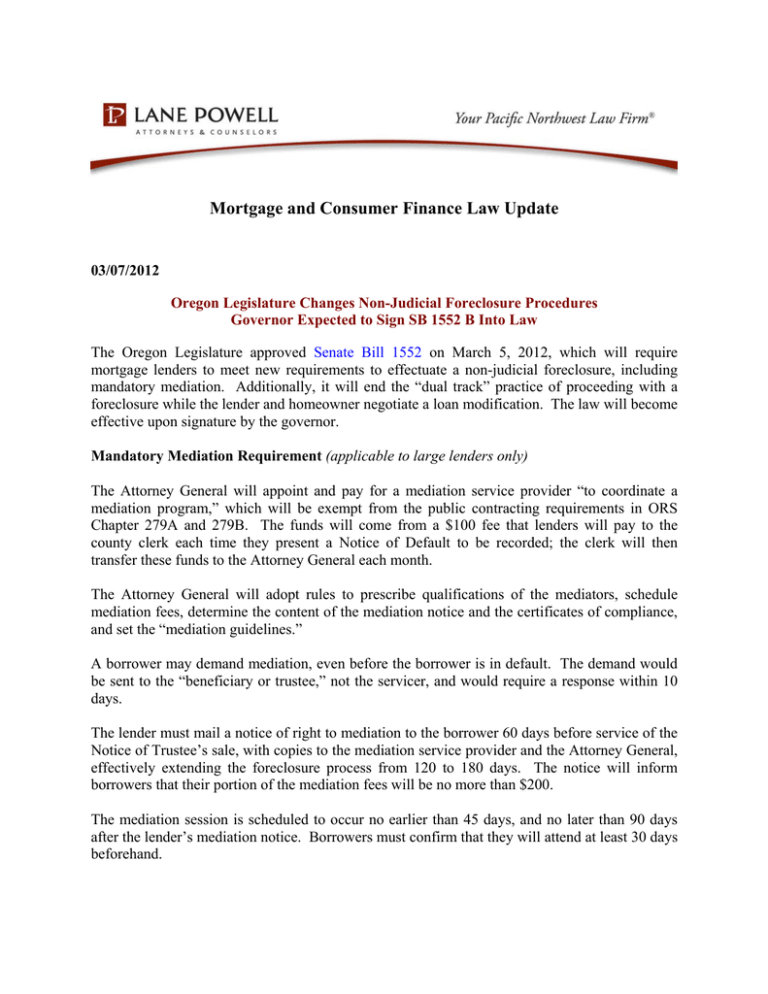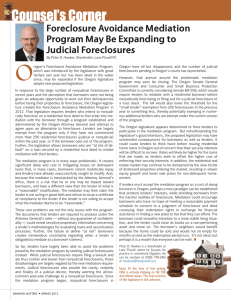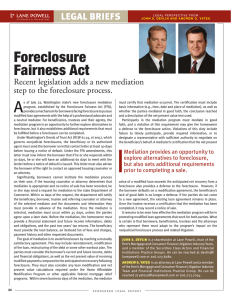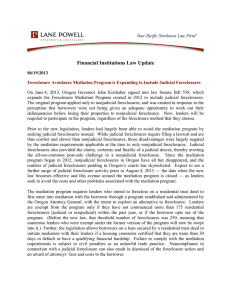Mortgage and Consumer Finance Law Update
advertisement

Mortgage and Consumer Finance Law Update 03/07/2012 Oregon Legislature Changes Non-Judicial Foreclosure Procedures Governor Expected to Sign SB 1552 B Into Law The Oregon Legislature approved Senate Bill 1552 on March 5, 2012, which will require mortgage lenders to meet new requirements to effectuate a non-judicial foreclosure, including mandatory mediation. Additionally, it will end the “dual track” practice of proceeding with a foreclosure while the lender and homeowner negotiate a loan modification. The law will become effective upon signature by the governor. Mandatory Mediation Requirement (applicable to large lenders only) The Attorney General will appoint and pay for a mediation service provider “to coordinate a mediation program,” which will be exempt from the public contracting requirements in ORS Chapter 279A and 279B. The funds will come from a $100 fee that lenders will pay to the county clerk each time they present a Notice of Default to be recorded; the clerk will then transfer these funds to the Attorney General each month. The Attorney General will adopt rules to prescribe qualifications of the mediators, schedule mediation fees, determine the content of the mediation notice and the certificates of compliance, and set the “mediation guidelines.” A borrower may demand mediation, even before the borrower is in default. The demand would be sent to the “beneficiary or trustee,” not the servicer, and would require a response within 10 days. The lender must mail a notice of right to mediation to the borrower 60 days before service of the Notice of Trustee’s sale, with copies to the mediation service provider and the Attorney General, effectively extending the foreclosure process from 120 to 180 days. The notice will inform borrowers that their portion of the mediation fees will be no more than $200. The mediation session is scheduled to occur no earlier than 45 days, and no later than 90 days after the lender’s mediation notice. Borrowers must confirm that they will attend at least 30 days beforehand. Lenders will have to appear in person, unless that requirement is waived by the mediator for good cause (being located out of state is not by itself good cause). Lenders are required to bring detailed documentation, including: (1) a full payment history; (2) a true copy of the note; (3) documents that “show the chain of title for the property” from the date of the original loan, including “conveyances, endorsements and assignments” of the trust deed and note; (4) proof of authority for any agent of the lender, any servicing agreement, any agreement relating to pledge of the note as a security; and (5) “any other documentation the Attorney General specifies by rule.” The Attorney General will specify in rule what documentation the borrower must bring to mediation. If an agreement for a loan modification, short sale or deed in lieu of foreclosure is reached, it must be reduced to writing and a copy must be sent to the Attorney General. If there is no agreement, the mediator must notify the Attorney General. Other Changes in SB 1552 B (applicable to all lenders, regardless of size) All lenders will have to serve a new notice of 30 days or more before the original or postponed sale date, stating that the lender has determined that the beneficiary is not eligible for a “foreclosure avoidance measure” or has not complied with one previously agreed to. The form of notice will be set by the Attorney General by rule, must explain the basis for the lender’s conclusion and a copy must be sent to the Attorney General. An affidavit certifying compliance must also be recorded. Failure to comply makes the lender liable for $500, including any actual damages and/or attorney fees. There is a two year statute of limitations. Sale postponements by lenders will have to be for a minimum of 15 days, except for a one-time postponement for no more than two calendar days. Notices of each postponement must be given to the borrower along with copies to all interested parties. The bill redefines what a “residential trust deed” is. Current law defines it as the borrower’s residence at the time a foreclosure is commenced. The new definition states: it is the borrower’s residence at the time the “default that results in an action to foreclose the obligation secured by the trust deed first occurs.” These changes may well cause lenders to pursue judicial foreclosures rather than use the new non-judicial foreclosure procedures. The cost of increased judicial foreclosures will not be insignificant. There will be a six-month delay after a sheriff’s sale, where the borrower has left the property, during which, the title is clouded by redemption rights and cannot be transferred. Additionally, borrowers will have to pay the entire loan balance to stop a judicial foreclosure, not just the missed payments. 2 For more information, please contact the Mortgage and Consumer Finance Practice Group at Lane Powell: MortgageandFinance@lanepowell.com This is intended to be a source of general information, not an opinion or legal advice on any specific situation, and does not create an attorney-client relationship with our readers. If you would like more information regarding whether we may assist you in any particular matter, please contact one of our lawyers, using care not to provide us any confidential information until we have notified you in writing that there are no conflicts of interest and that we have agreed to represent you on the specific matter that is the subject of your inquiry. Copyright © 2012 Lane Powell PC Seattle | Portland | Anchorage | Olympia | Tacoma | London 3





